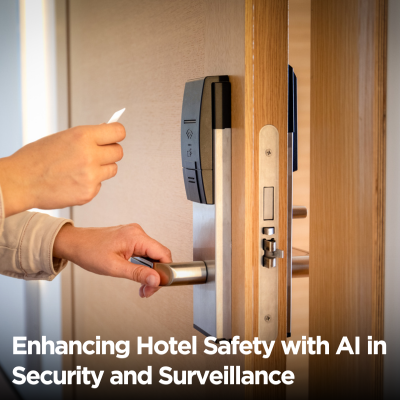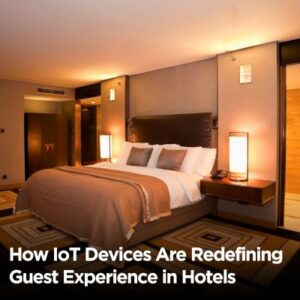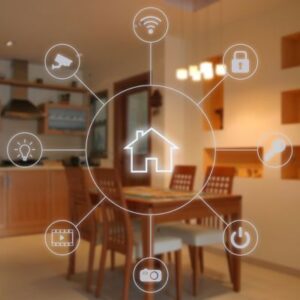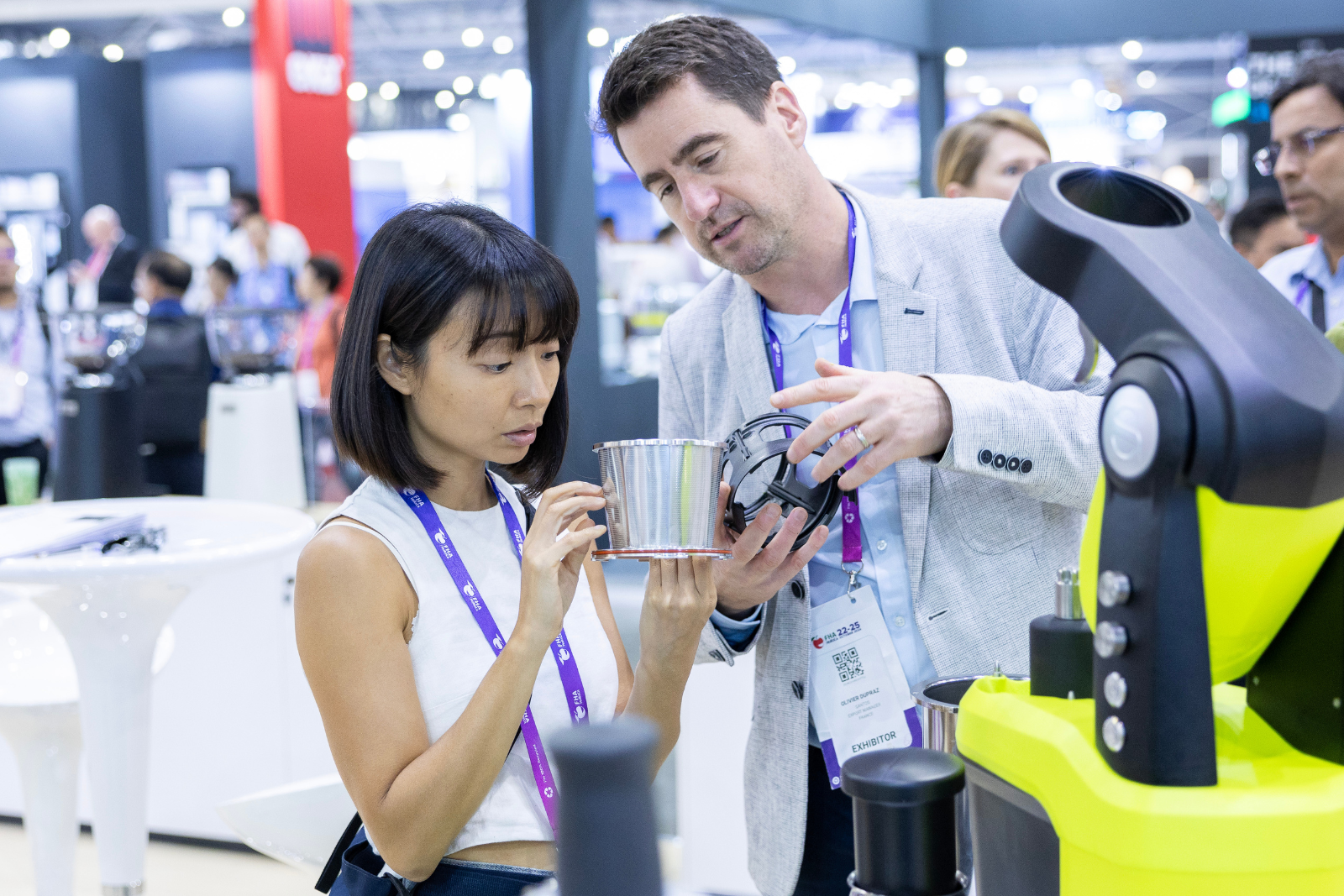Guest safety is a critical part of hotel operations. From managing unauthorized access to responding to emergencies, hotels face daily challenges in keeping guests and staff secure.
Traditional methods, such as static cameras, keycard access, and physical patrols, are still used; however, they often have limitations when it comes to detecting threats early or responding quickly enough.
To improve daily security, many hotels are now using systems that can monitor activity more closely and alert staff when something unusual occurs.
These systems help identify risks more quickly and support faster action when needed. They also reduce the pressure on staff by automating certain safety tasks.
Using smarter technology for hotel safety with AI allows hotels to strengthen guest protection through better monitoring and timely response. It supports safer environments without affecting the guest experience.
As more hotels invest in modern security solutions, safety becomes a more active part of daily hotel management rather than something that only reacts after a problem occurs.
Key AI Technologies Revolutionizing Hotel Security
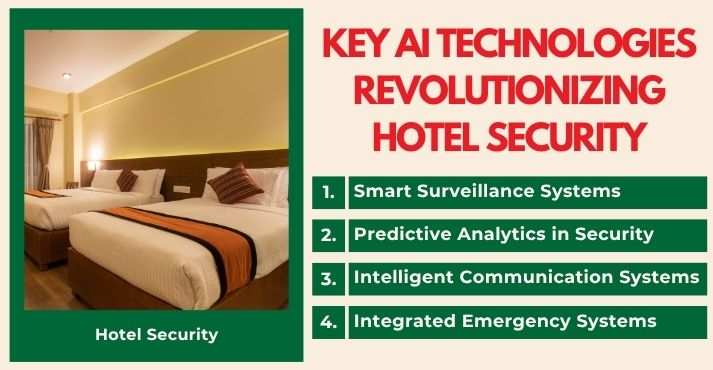
Hotel security is becoming smarter, more responsive, and more efficient. As guest expectations continue to rise, hospitality leaders are exploring new ways to manage surveillance, emergency response, and communication systems.
These technologies enhance traditional methods by enabling faster risk detection, more reliable alerts, and improved coordination across hospitality management systems.
1. Smart Surveillance Systems
Modern surveillance is more than just recording. Intelligent systems interpret activity in real time, recognize potential threats, and support faster decision-making while operating silently in the background.
How AI Enhances CCTV Systems
Hotels once relied solely on staff monitoring multiple screens. Now, advanced CCTV systems analyze live video feeds to flag suspicious behavior such as tampering, unauthorized access, or unattended bags.
These systems use pattern recognition and motion detection to identify unusual activities quickly, alerting security teams instantly.
By automating video analysis, these upgraded CCTV systems reduce the burden on human operators and minimize the risk of missed incidents. Real-time alerts allow security personnel to respond promptly, improving overall safety.
Face Recognition for Access Control
Instead of relying solely on keycards, some hotels now use face recognition at staff-only doors, guest elevators, and VIP access zones. This enhances security by ensuring that only registered individuals can access restricted areas.
For example, Marriott International partnered with Alibaba to pilot facial recognition check-in technology at two hotels in China: Hangzhou Marriott Hotel Qianjiang and Sanya Marriott Hotel Dadonghai Bay.
Guests could scan their IDs, take a photo, and enter contact details on a self-service machine, which then verified identities and dispensed room key cards.
This system reduced check-in times from at least three minutes to under one minute, thereby improving operational efficiency and the overall guest experience.
Automated Threat Detection
Surveillance isn’t just about watching; it’s about interpreting behavior. With motion analytics and behavioral mapping, systems can detect instances of loitering, people moving against the traffic flow, or trespassing in closed areas.
For example, the Plaza Hotel and Casino in Las Vegas implemented Patriot One Technologies’ multi-sensor threat detection platform, Patscan.
This system uses advanced technology to detect weapons, disturbances, elevated body temperature, and facial masks, significantly enhancing security measures.
2. Predictive Analytics in Security
Smart technology doesn’t just react; it anticipates. With sufficient data, systems can identify patterns, pinpoint weak points, and predict when and where a security issue is more likely to occur.
Using Data to Predict Risks
Large city-center hotels often experience fluctuating visitor volumes. By analyzing lobby traffic, guest demographics, and check-in and check-out trends, systems can identify high-risk time windows when incidents are more likely to occur.
This allows security teams to allocate resources more effectively and increase vigilance during those critical periods.
These predictive insights help prevent incidents before they happen by turning vast amounts of data into actionable intelligence that supports better decision-making and risk management.
Learning from Historical Incidents
What happened last year on Memorial Day weekend? What time do fire alarms usually go off? Systems now learn from past events to help security staff prepare smarter for upcoming high-risk dates or operational bottlenecks.
This historical approach is already embedded in several high-end hospitality management systems.
For example, data from guest complaints about nighttime disturbances has helped some hotels adjust camera angles, modify lobby lighting, and deploy extra staff in previously under-monitored areas.
3. Intelligent Communication Systems
Safety isn’t just about detection. How quickly a guest or employee receives the right information can significantly impact the outcome of any security incident.
Virtual Assistants That Support Safety
Today’s digital concierges do more than handle room service. Some now respond to safety-related queries such as, “Where’s the nearest emergency exit?” or “Is it safe to go outside right now?”
These virtual assistants can guide guests to safe zones or provide emergency instructions instantly, with no staff intervention needed.
For example, hotels using HelloShift or Ivy report faster responses to guest concerns and a reduction in front desk call volume. These virtual agents operate 24/7, enhancing the guest experience during both routine inquiries and urgent situations.
This level of automation in hotels helps reduce human error and ensure consistent communication, even during high-stress scenarios.
4. Integrated Emergency Systems
Responding fast during an emergency is essential. Technology now enables systems to interact across departments, such as smoke alarms and elevator controls, to protect guests more efficiently.
Fire and Smoke Detection
Sensors connected to thermal imaging cameras now track subtle heat changes across public and private spaces. These systems detect fires at earlier stages, and some can even estimate how smoke will travel through hallways.
For example, the tragic 1982 fire at Hotel New Japan in Tokyo highlighted the need for better fire detection and safety measures.
Although thermal imaging was not available at the time, AI-powered hotel security systems now help prevent similar incidents by providing early warnings and enabling timely evacuations.
These systems adjust evacuation routes based on real-time crowd flow and localized air quality, allowing for faster and safer emergency responses.
Benefits of AI-Driven Security in Hotels
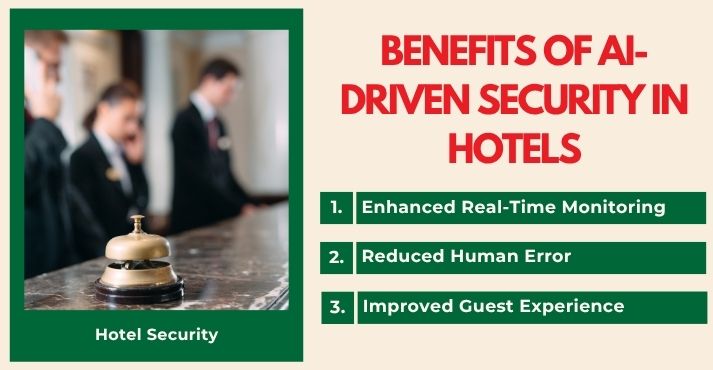
Smart security systems are helping hotels become more proactive and efficient in managing safety. These technologies operate continuously, minimize oversight, and allow staff to respond quickly and accurately.
Whether at luxury resorts, extended-stay hotels, or eco-hotels, enhanced safety features benefit both guests and staff across all property types.
1. Enhanced Real-Time Monitoring
Modern surveillance systems offer continuous coverage without fatigue. They monitor multiple zones at once, including entrances, hallways, elevators, and back-of-house areas.
If someone enters a staff-only zone or leaves luggage unattended in a lobby, the system can immediately send alerts to the appropriate team.
This type of surveillance filters out routine movement and focuses on abnormal activity, enabling security personnel to act more quickly and stay focused on genuine issues.
The use of smart monitoring tools in hotels has improved response times while reducing reliance on manual observation.
AI surveillance for hotels helps ensure that potential risks are flagged early, giving staff the chance to prevent incidents before they escalate.
2. Reduced Human Error
Even well-trained staff can miss signs of suspicious behavior during long or busy shifts. Smart systems operate without distractions and can consistently track movements, entry attempts, or irregular activity patterns across an entire property.
This approach significantly lowers false alarms, enhances decision-making, and provides clear documentation for review when needed.
The benefits of AI in hotel security include fewer mistakes caused by fatigue, multitasking, or oversight, resulting in a more reliable overall safety operation.
By automating routine checks, hotels can allocate their human resources more effectively, focusing on areas where they are most valuable, such as guest interaction or emergency response.
3. Improved Guest Experience
When guests feel safe, they are more likely to relax and enjoy their stay. Smooth and secure arrivals set the tone for a positive visit, especially during busy hours.
Self-check-in kiosks, supported by identity verification systems, streamline the process while ensuring only registered guests receive room access.
Surveillance systems designed to operate discreetly help maintain a calm and welcoming atmosphere. They reduce the need for intrusive checks while still ensuring strong protective measures.
Artificial intelligence in hotel safety allows operations to run smoothly by maintaining adequate security without disrupting the guest environment. These systems help maintain a space where protection supports comfort, rather than interfering with it.
AI Innovations in Hotel Security Surveillance
Modern hotel security relies on connected and intelligent infrastructure that responds to threats instantly and discreetly. Through seamless integration with existing systems, these innovations help detect problems before they escalate.
From motion detectors to smart locks, digital coordination allows hotels to act with precision and speed while maintaining guest comfort.
Integration with IoT Devices
Security systems in hotels are now closely linked with IoT technologies such as motion sensors, smart locks, thermal detectors, and access control panels. These tools offer real-time monitoring without requiring constant staff oversight.
A smart door lock can log every access attempt, and when combined with occupancy or motion sensors, it can flag suspicious movement in unoccupied rooms.
In guest rooms, IoT devices help monitor safety-related conditions such as unexpected temperature shifts, open windows, or jammed locks. These alerts allow hotel teams to take timely action by remotely locking doors, adjusting room settings, or dispatching assistance.
Smart security systems for hotels offer scalable solutions that reduce vulnerability while preserving operational efficiency.
This is especially important for different types of hotels, which often operate with leaner staff models and emphasize sustainability and privacy.
AI for Emergency Response
During emergencies, digital systems identify critical events by analyzing data from multiple sources, including temperature sensors, surveillance cameras, and electronic access logs.
This enables a quick and coordinated response. For example, if smoke is detected, the system can activate alarms, adjust ventilation, unlock emergency exits, and notify local authorities without delay.
Such systems also improve internal coordination. Staff across departments receive consistent, real-time alerts, which minimize confusion and ensure faster action.
Hotel safety through AI-based logic enables better control during medical emergencies, fire threats, or security breaches.
Additionally, modern systems monitor digital infrastructure to ensure safe connectivity. Practices like safely using hotel Wi-Fi are enforced through encryption checks and automatic threat detection to prevent network vulnerabilities.
The Future of AI in Hotel Security
Hotel security is entering a new phase where technology supports prevention, not just response. As systems become smarter and more connected, hotels can stay ahead of potential threats while maintaining a seamless and secure guest experience.
This is particularly important for large properties and resorts, where continuous monitoring and proactive safety measures are essential.
Evolving Capabilities of AI Surveillance
Security systems are no longer limited to simple alerts. They now learn from past incidents, refine their ability to detect risk patterns, and adjust their future responses accordingly.
This means fewer false alarms and faster identification of real issues, whether it’s unexpected movement in staff-only areas or repeated failed access attempts at guest room doors.
Looking ahead, hotels may begin using automated patrol units or camera-equipped drones, especially in outdoor or expansive locations.
These additions would allow coverage of hard-to-monitor areas, such as rooftops, parking lots, or open-air courtyards, allowing teams to respond faster and more efficiently.
This kind of automated hotel security with AI is especially relevant for larger properties with multiple buildings or spread-out amenities.
As part of the digital transformation in hotels, these systems will continue to enhance risk management in real-time, with minimal disruption to hotel operations.
Guest Privacy vs. Security
Balancing effective monitoring with guest privacy is essential. Guests expect to feel safe, but not watched. That’s why the placement of surveillance systems, the way data is handled, and how footage is accessed must follow strict ethical and legal standards.
Hotels should be transparent about what is monitored and avoid storing personal information unnecessarily. For instance, systems can track unusual movement in hallways without recording private guest interactions.
These precautions are important during sensitive moments of the guest journey, like check-in or room access.
Ultimately, improving hotel security with AI depends on building trust as much as it does on using smart tools. As systems become more advanced, hotels will need clear policies, secure data handling practices, and a focus on guest dignity and discretion.
Challenges of Implementing AI in Hotel Security
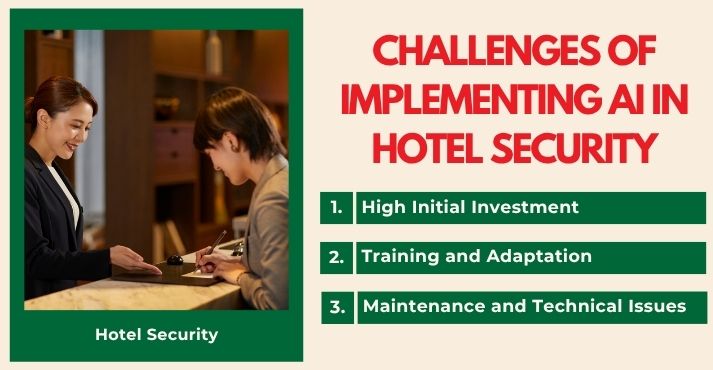
Advanced security technology in hotels brings significant benefits but also presents a set of challenges that must be carefully managed. Being aware of these hurdles helps hotel managers plan effectively and ensures smoother integration with existing operations.
1. High Initial Investment
Installing modern security systems requires a substantial upfront financial commitment. The cost of equipment, software, and infrastructure upgrades can be considerable, especially for large hotels or chains.
However, these systems can reduce long-term expenses by minimizing the need for extensive security personnel and helping to prevent costly incidents such as theft or property damage.
Over time, the savings from increased efficiency and risk prevention often justify the initial investment.
2. Training and Adaptation
New security technologies require hotel staff to learn how to operate and respond to system alerts effectively. This training period can be time-consuming as employees adjust to new workflows and tools.
Security teams, front desk personnel, and management must all understand how to interpret data and act on security notifications.
Providing thorough and ongoing training is crucial to fully use the system’s capabilities and ensure it supports overall hotel safety.
3. Maintenance and Technical Issues
Maintaining advanced security systems requires regular updates and ongoing technical support to ensure everything runs smoothly. Software glitches, hardware malfunctions, or network disruptions can interrupt security monitoring and impact hotel operations.
Hotel managers face the practical challenge of ensuring quick repairs and minimizing downtime. Establishing strong vendor relationships and investing in reliable maintenance plans can help address these challenges and keep security systems operating at peak performance.
These challenges are inherent in implementing advanced technology in hotel security management, and careful planning helps hotels overcome them to create a safer environment.
Conclusion
Hotel security is becoming smarter and more efficient, offering significant benefits such as faster threat detection, reduced human error, and improved overall safety.
These advancements help hotels protect guests and staff while maintaining smooth operations and enhancing guest confidence.
As technology continues to improve, security systems will become even more capable of anticipating risks and responding quickly, making hotels safer places to stay.
Looking ahead, hotels will find new ways to integrate these innovations seamlessly into their daily operations, balancing safety with privacy and comfort.
The ongoing progress in security technology promises a future where hotels can offer both exceptional protection and a welcoming environment, ensuring peace of mind for everyone involved.

